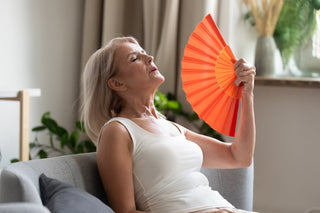When hot flashes happen at night, they are called night sweats. Irritability, mood swings and vaginal dryness are other frequent symptoms of this transition period.
Symptoms: CESSATION OF MENSTRUAL CYCLE – HOT FLASHES – IRRITABILITY
HEALTH RECOMMENDATIONS:
DIET
Many symptoms of menopause can be controlled with the proper lifestyle. Between adequate hydration, regular physical exercise and stress management, diet remains a major impacting factor on the incidence of menopausal symptoms. Some foods can actually increase the number of hot flashes while other foods will facilitate the transition to post-menopause. Among foods that can worsen the situation, we find strong spices, alcohol, sugar and saturated fats. On the other hand, phytoestrogen-rich foods such as soy, flax and legumes will help rebalance the hormonal activity in the female body. It is well known that Asian women experience fewer, less severe menopause symptoms than Western women, in part due to their lifestyle and phytoestrogen-rich diet, especially from soy. Eating smaller meals will also be beneficial. Simply add healthy snacks between them to get your fill.
HYDRATION
A menopausal woman should drink between 1.5 and 2 liters of water daily. Not only will a good hydration prevent tissue dehydration (which is more frequent at this time of life), but it will also minimize the impact of hot flashes.
PHYSICAL EXERCISE
A menopausal woman should remain physically active. The general health will be improved, but some sources believe exercise can reduce the incidence of hot flashes.
BASIC ADVICE
Smoking and physical inactivity can increase the frequency of hot flashes. It is therefore important to remain active even during this time of life and it is always time to get rid of bad habits such as smoking.

